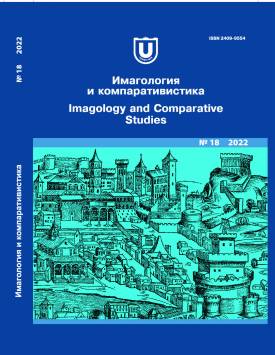Moscow by Andrei Bely in the dialogue with Austrian literature of the 20th century (a case study of Gustav Meyrink’s The Golem)
The article identifies typological parallels between Andrei Bely and G. Meyrink based on their similar worldviews: Bely, the ideologist of Russian Symbolism, was an adept of Rudolph Steiner’s anthroposophy; Gustav Meyrink, an outstanding representative of the Prague School, had an intense interest in occultism and mysticism. Both factors - the aesthetic representation of unconsciousness in fiction and the appellation to mystic and occult experience - bring together Bely’s novel Moscow (1926-1932) and Meyrink’s The Golem (1915). The interest to the oeuvre of both writers emerges in the period of breaking the old paradigm, the epoch of methodological impasse, and the search for new heuristic opportunities of text interpretation. The article reveals the common features of oneyropoetics in both novels and the typological proximity of the “characters of the way” (Ivan Korobkin and Athanasius Pernat) in the aspect of life creation (Bely) and in overcoming the “golemic” aspect and creating “Higher Self’ (Meyrink), raising the problem of the ambivalent finals. Architectonically, both novels are a two-layer text for a “mass” reader on the one hand and a special “initiated” reader on the other. The demonic urban spaces of Moscow and Prague take on the shape of a utopian city, undergoing transformed through the character’s mysterial suffering and becoming the final of their way (initiation) to “Higher Self.” The ideological centre of the novels is the concept of personality; namely, awareness and overcoming the “rapture” (“golemic nature”) by the character in Austrian (Prague) novel and responsibility for a scientific discovery and desire to “warm the Universe” by the character of the Russian novel, which results in his search for a spiritual integrity. Dreams as a bright epitomy of linguistic experiment serve for the plot formation in Moscow and accompany the character, the scientist, throughout his entire spiritual way. The Golem has a frame composition where dreaming and identification of the narrator with Pernat, who passed a mysterial way, become his spiritual experience and initiation. The present study is intended to show the opportunities of “comparative poetics”, which allows to correlate the oeuvre of both writers who fit stadially in the Expressionist Aesthetic and in more epochal sense - in the poetics of art modality (Samson Broytman). The author declares no conflicts of interests.
Keywords
Russian and Austrian literary contacts,
oneyropoetics,
Andrei Bely,
Moscow,
Gustav Meyrink,
The GolemAuthors
| Sharapenkova Natalia G. | Petrozavodsk State University | natshar@mail.ru |
Всего: 1
References
Тиме Г.А. О некоторых тенденциях современной компаративистики (Теоретические и практические аспекты) // Россия, Запад, Восток: встречные течения. К 100-летию со дня рождения академика М.П. Алексеева. СПб. : Наука, 1996. С. 387-395.
Бройтман С.Н. Историческая поэтика. М. : РГГУ, 2001. 405 с.
Пискунов В.М. Из наблюдений над текстом романа «Москва» // Пискунов B. М. Чистый ритм Мнемозины. М. : Альфа М, 2005. С. 175-185.
Барковская Н.В. Под знаком Гераклита. Идейно-художественное своеобразие романа А. Белого «Москва» // Русская литература 20 века. 1992. Вып. 1. C. 94-104.
Спивак М.Л. Андрей Белый - мистик и советский писатель. М. : РГГУ, 2006. 577 с.
Оболенска Д. Путь к посвящению. Антропософские мотивы в романах Андрея Белого. Гданьск : Гданьский ун-т, 2009. 274 с.
Тимина С.И. Забытая классика (роман Андрея Белого «Москва») // Известия Российского государственного педагогического университета им. А.И. Герцена. 2016. № 1 (179). С. 20-25.
Магомедова Д.М. Мотивы «Страшной мести» Н. Гоголя в романном цикле А. Белого «Москва» // Андрей Белый в изменяющемся мире: к 125-летию со дня рождения / [сост. М.Л. Спивак, Е.В. Наседкина, И.Б. Делекторская]. М. : Наука, 2008. С. 398-403.
Коно В. Мотив «глаза» в романе «Москва» А. Белого // Андрей Белый в изменяющемся мире: к 125-летию со дня рождения / [сост. М.Л. Спивак, Е.В. Наседкина, И.Б. Делекторская]. М. : Наука, 2008. С. 489-498.
Зусман В.Г. Пражский круг // История австрийской литературы ХХ века : в 2 т. М. : ИМЛИ им. Горького РАН, 2009. Том I. Конец XIX - середина XX в. С. 262-279.
Бескровная Е.Н. Вечный жид Густава Майринка. URL: https://interactive-plus.ru/e-articles/epub-20140725/epub-20140725-3319.pdf
Теличко А.В. Трансформация жанра «роман становления» («Entwicklungsroman») в творчестве Г. Майринка // Вестник Балтийского федерального университета им. И. Канта. Серия: Филология, педагогика, психология. 2013. С. 151-156.
Каминская Ю.В. Романы Густава Майринка 1920-х гг. СПб. : Изд-во Санкт-Петербургского ун-та, 2004. 154 с.
Фрумкин К.Г. О ложном гуманизме и настоящей магии. Взгляд на пьесу Горького «На дне» после прочтения Густава Майринка. URL: https://fantlab.ru/article881
Гугнин А.А. Магический реализм в контексте литературы и искусства XX века: феномен и некоторые пути его осмысления. М. : Институт славяноведения РАН, 1998. 120 с.
Ковтун Е.Н. Поэтика необычайного: Художественные миры фантастики, волшебной сказки, утопии, притчи и мифа. М. : Изд-во МГУ, 1999. 308 с.
Иванов Вяч.Вс. Профессор Коробкин и профессор Бугаев. К жанровой характеристике романа «Москва» А. Белого // Москва и «Москва» Андрея Белого. М. : РГГУ, 1999. С. 11-28.
Азадовский К., Лавров А. Новое о встречах Томаса Манна с русскими писателями («Слово благодарственное» Андрея Белого Томасу Манну) // Русская литература. 1978. № 4. С. 146-151.
Андрей Белый и Иванов-Разумник. Переписка 1913-1932 гг. / публ., вступ. ст. и комм. А.В. Лаврова и Дж. Мальмстада. СПб. : Atheneum. Феникс, 1998. 736 с.
Тургенева А. Воспоминания о Рудольфе Штейнере и строительстве первого Гётеанума. М. : Новалис, 2002. 137 с.
Ходасевич В.Ф. Андрей Белый // Ходасевич В.Ф. Некрополь. Воспоминания. М. : Сов. писатель, Олимп, 1991. С. 44-69.
Берберова Н. Курсив мой: Автобиография. М. : АСТ. Астрель, 2010. 765 с.
Кожевникова Н.А. Евангельские мотивы в романе Андрея Белого «Москва» // Евангельский текст в русской литературе XVIII-XX вв. Петрозаводск : Изд-во ПетрГУ, 1995. С. 493-504.
Лотман Ю.М. Сон - семиотическое окно // Лотман Ю.М. Семиосфера. СПб. : Искусство-СПб, 2010. С. 297-335.
Майринк Г. Голем. М. : Вече, 2019. 352 с.
Никифоров В. Синдром Голема // Литературное обозрение. 1992. № 5-6. С. 65-69.
Белый А. Москва / сост. С.И. Тиминой. М. : Сов. Россия, 1989. 768 с.

